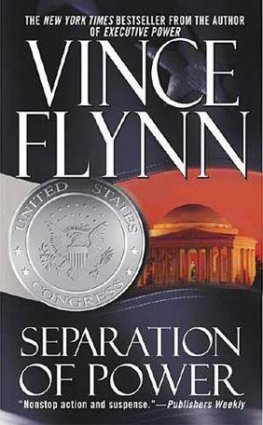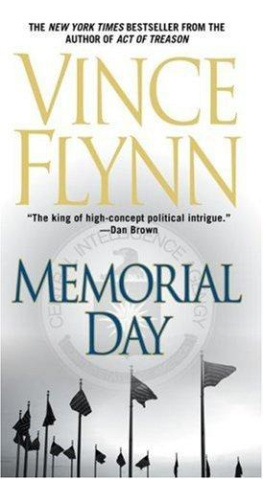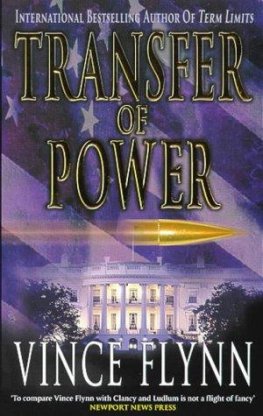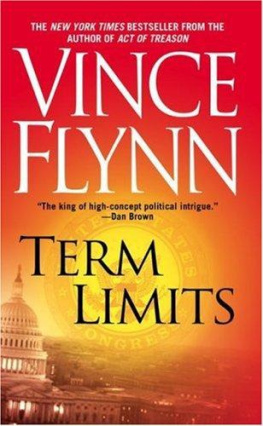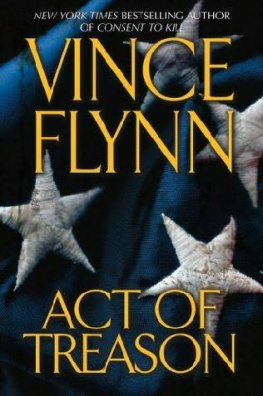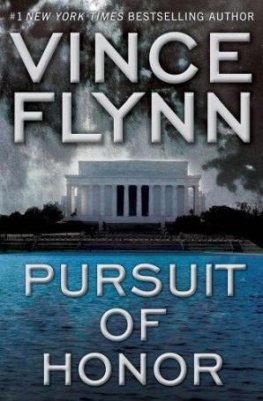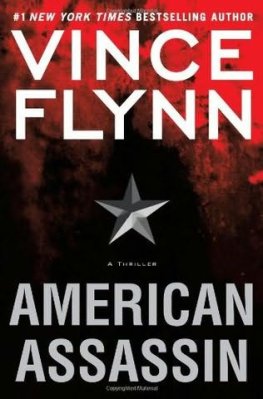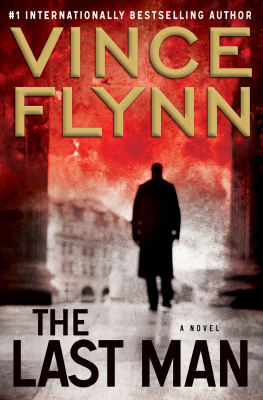
SEPARATION OF POWER
by
Vince Flynn
To Emily Bestler
First and foremost, I have to thank my lovely wife, Lysa, for her patience and understanding while I labored over this novel-especially the last three months. Darling, you make it all worthwhile. To my agent, Sloan Harris, for all of his wise counsel and good humor. It has been great watching all of your successes over the last year. To my editor, Emily Bestler, for giving me the time and cover to finish this book. Once again, you've taken it to another level, and did so without giving me any anxiety attacks.
To Larry Johnson, an incredibly knowledgeable counterterrorism specialist, whose advice is always welcome. To Pat O'Brien, an old high school friend and a man who knows his way around the Hill. To Bill Harlow, an excellent author and the director of the CIA's office of public relations, thank you for patiently answering my questions. To Fred Mangel of the CIA's office of general counsel, for educating me on national security nondisclosure documents and Congressional Notification. To all of my sources who wish to remain anonymous, I once again thank you for your help. To Sessalee, Karen, Tommy, Edward, and Paula for our annual lunch in New York, where we always talk about much more than books. And as always, to all of the booksellers and readers, your enthusiasm and support make this a very fulfilling job.
Dr. Irene Kennedy stood over the fresh mound of dirt and wept. It had been a small funeral; relatives and a few close friends. The others had already left the windswept cemetery, and were on their way back into town for a light lunch at an aunt's house. The forty year-old director of the CIA's Counterterrorism Center wanted to spend a few moments alone at the grave of her mentor. Kennedy lifted her head and wiped the tears from her eyes as she took in the landscape. She ignored the biting chill of western South Dakota and let it all out. This would be her last chance to grieve so openly for the loss of the man who had taught her so much. After this it was back to Washington, and perhaps the greatest test of her life. During Stansfield's final days the director of the CIA had told her not to worry. He had made all the proper arrangements. She would take his place as the next director of the Central Intelligence Agency. Kennedy did not relish the confirmation process that awaited her, but what really had her worried was measuring up to her old boss. He was the greatest man she had ever known.
Thomas Stansfield died on a cool fall morning surrounded by his children, grandchildren and Irene Kennedy. It was exactly as he'd wanted it to be. Just two weeks before his eightieth year, he wanted to go no further. Those last few days he had sat in his leather chair, a calm haze of morphine dulling both his mind and the stabbing pain of the cancer that was ravaging his insides. He stared out the window as the last of fall's leaves fell. This was the final autumn of his life. Thomas Stansfield's rise to the top of the Central Intelligence Agency was the stuff that legends were made of. Born near the town of Stoneville, South Dakota, in 1920, he came of age during two of his country's most difficult decades. The carefree days of his youth had been squelched by dry hot summers and apocalyptic dust storms that rose up from the southern plains and turned day into night. The Great Depression had taken its toll on the Stansfield family. One of his brothers, an uncle and several cousins had been lost along with two of the four grandparents.
Stansfield's parents had met in their teens, both fresh off the cattle cars that had sprinkled countless European immigrants across America in the years that followed World War I. His father was from Germany; his mother from Norway. Thomas Stansfield grew up mesmerized by the stories his parents and grandparents told of their homelands. He learned English in school, but at night by the fire it was the native languages of his parents and grandparents that was spoken. He excelled in school, and from an early age showed far less interest in farming than his brothers. He knew that someday he would return to Europe and explore his family's history. When he was given the chance at the age of seventeen to attend South Dakota State University on a full academic scholarship, he didn't hesitate.
College was not difficult for Stansfield. He majored in engineering and history and graduated at the top of his class. As the hot and hungry days of the thirties wound to a close Stansfield recognized something far more ominous on the horizon. While most of his classmates and professors were turned inward, obsessed with America's problems, Stansfield kept an eye on the rise of fascism in Europe. His intellect told him that something foreboding was on the horizon.
Franklin Delano Roosevelt also knew that something innately evil was occurring in Europe and the Far East. But there was nothing Roosevelt could do in the late thirties. The political will to intervene was not there. America had lost too many other sons in the first World War, and its citizens weren't about to jump into another so quickly. It was Europe's problem. So Roosevelt, always the keen politician, bided his time and prepared for war as best he could. One of the things he did was to call on his close friend Colonel Wild Bill Donovan. Donovan, a New York lawyer, had been awarded the Medal of Honor for leading the Fighting 69th infantry regiment in France during World War I and was one of Roosevelt's most keen and intense advisors. At the urging of Donovan, Roosevelt authorized the formation of the Office of Strategic Services. One of the first things Donovan did was to scour the armed forces and American universities for young men with the language skills that would aid the OSS in analyzing intercepted Axis power messages. Donovan also had something else in mind. He knew it wasn't a question of if America would enter the war but a question of when. And when it did he wanted to be ready to insert Americans behind German lines to organize resistance forces, gather intelligence and if called on, assassinate the enemy.
Thomas Stansfield was one of Wild Bill Donovan's greatest recruits. The thin farm boy from the western steppes of South Dakota was fluent in German, Norwegian and spoke decent French. During the war Stansfield was parachuted into both Norway and later, France. Still in his early twenties, he was the leader of what was to become one of the OSS's most effective Jedburgh Teams. After the war General Eisenhower would say that the invasion of France would not have been possible if it were not for the efforts of the courageous Jedburgh Teams to organize French resistance, provide detailed intelligence reports and ultimately disrupt and confuse German troop movement during the first days of the invasion. Thomas Stansfield had been one of those brave men who had operated behind enemy lines for months preparing the way for the invasion force. In the predawn hours of D-Day Stansfield and his Jedburgh Team demolished a major rail line and a phone junction box.
After the war Stansfield continued to serve his country. When the CIA was formed in 1947 he became one of its first employees. He stayed in Europe for much of the next four decades, almost all of it behind the Iron Curtain. He was one of the Agency's most effective recruiters of foreign agents. In the eighties President Reagan was so impressed with the man's steely demeanor he made him the Moscow Station Chief because he knew Stansfield would drive the Russians nuts. After Moscow he was brought home to become the deputy director of operations and then finally director of Central Intelligence. He had served his country well and had sought no recognition. On his deathbed President Hayes had come to visit him. The President told Stansfield that preparations were under way for a full military burial at Arlington National Cemetery. The President also expressed his interest in eulogizing Stansfield himself. It was the least the country could do for a man who had given so much. Stansfield in his typical humble way declined, and told the President that he wanted to be buried where he'd been born. No pomp and circumstance, just a simple private ceremony for a very private man.
Next page
